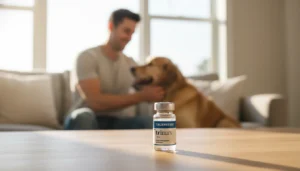Navigating Surgery: Can I Take Tirzepatide Before My Procedure?

Introduction
Undergoing surgery can be a significant life event, often accompanied by a multitude of questions and preparations. From understanding the procedure itself to managing personal health conditions, every detail counts. One question that increasingly arises for individuals on a weight loss or diabetes management journey is: “Can I take tirzepatide before surgery?” This isn’t a simple yes or no answer, as it involves a nuanced understanding of how medications like tirzepatide interact with the body, anesthesia, and the recovery process. The importance of this question has grown significantly as more people embrace effective solutions for managing their weight and blood sugar, making it crucial to navigate these medical considerations with informed decisions.
At TrimRx, our journey began with a shared vision to help individuals embrace healthier lifestyles by merging cutting-edge telehealth innovations with effective weight loss solutions. We understand the complexities of managing personal health alongside significant medical events like surgery. Our platform is a user-friendly and supportive space where individuals receive personalized, medically supervised care—all designed to make sustainable weight loss attainable and tailored to the individual. We believe that sustainable weight loss should be achieved through science, empathy, and a transparent approach, especially when unexpected medical circumstances arise.
This comprehensive guide aims to shed light on the considerations surrounding tirzepatide and surgical procedures. We will explore why this question is so vital, delve into the physiological effects of tirzepatide that are relevant to surgery, examine the evolving medical guidelines, and provide actionable insights into communicating effectively with your healthcare team. Our goal is to empower you with the knowledge needed to engage confidently in discussions with your doctors, ensuring your safety and optimal outcomes, both for your surgery and your continued wellness journey.
Understanding Tirzepatide and Its Impact on Your Body
Tirzepatide is a groundbreaking medication utilized in the management of type 2 diabetes and for significant weight loss. It operates through a dual-agonist mechanism, mimicking two naturally occurring hormones: glucagon-like peptide-1 (GLP-1) and glucose-dependent insulinotropic polypeptide (GIP). This dual action sets it apart, offering comprehensive benefits for metabolic health.
How Tirzepatide Works
The core functions of tirzepatide that are most relevant to pre-surgical considerations include:
- Delayed Gastric Emptying: One of the primary ways tirzepatide aids in weight loss and blood sugar control is by slowing down the rate at which food leaves the stomach. This mechanism promotes feelings of fullness, reduces appetite, and helps to stabilize blood glucose levels after meals. While beneficial for weight management, this delayed gastric emptying is a key factor in surgical planning.
- Blood Sugar Regulation: For individuals with type 2 diabetes, tirzepatide helps to lower blood sugar by increasing insulin release in response to high glucose levels and decreasing glucagon secretion, which prevents the liver from releasing too much sugar. Maintaining stable blood sugar is critical, especially around the stress of surgery.
- Weight Loss Promotion: By affecting appetite and satiety, tirzepatide leads to a reduction in calorie intake, resulting in meaningful and sustained weight loss for many individuals.
These powerful effects, while largely positive for long-term health, introduce specific considerations when a surgical procedure is on the horizon. Our approach at TrimRx emphasizes understanding these nuances, ensuring that your personalized plan integrates seamlessly with all aspects of your health. To see if a personalized plan with medications like tirzepatide, or other GLP-1 medications such as Compounded Semaglutide, Oral Semaglutide, Ozempic®, Compounded Tirzepatide, Oral Tirzepatide, Mounjaro®, Zepbound®, or Wegovy®, is right for you, we encourage you to take our free assessment quiz.
Why Taking Tirzepatide Before Surgery Requires Special Consideration
The physiological changes induced by tirzepatide necessitate careful evaluation before any surgical procedure, particularly those requiring general anesthesia or deep sedation. The primary concerns revolve around patient safety during and after the operation.
Risks Associated with Delayed Gastric Emptying
The most significant concern with delayed gastric emptying is the increased risk of pulmonary aspiration. When a patient is under general anesthesia or deep sedation, their protective airway reflexes are suppressed. If the stomach still contains food or liquid, there is a risk that this material could be regurgitated and then inhaled into the lungs. This can lead to severe complications, including:
- Aspiration Pneumonia: An infection of the lungs caused by inhaling foreign material, which can be life-threatening.
- Airway Obstruction: Food particles can physically block the airways, hindering breathing.
Traditional preoperative fasting guidelines are designed to ensure the stomach is empty, significantly reducing this risk. However, tirzepatide’s effect on digestion can make it challenging to predict when the stomach is truly empty, even with standard fasting.
Impact on Blood Sugar Management
Surgery places significant stress on the body, which can affect blood sugar levels. For individuals taking tirzepatide for type 2 diabetes, stopping the medication abruptly or continuing it without careful planning can lead to complications:
- Hyperglycemia: Uncontrolled high blood sugar can impair wound healing, increase infection risk, and prolong recovery.
- Hypoglycemia: If other blood sugar-lowering medications are not adjusted, or if food intake is reduced post-surgery, there’s a risk of dangerously low blood sugar.
Your medical team needs to meticulously manage your blood sugar to ensure stability throughout the perioperative period. This often involves temporarily switching to shorter-acting medications or adjusting insulin doses.
Potential for Nausea and Vomiting
Tirzepatide, like other GLP-1 receptor agonists, can cause gastrointestinal side effects such as nausea and vomiting. These symptoms, if present before or immediately after surgery, can exacerbate the risk of aspiration and make the recovery process more uncomfortable. Ensuring a smooth surgical experience often means minimizing any factors that could contribute to these symptoms.
Hydration and Nutritional Status
Some individuals on tirzepatide may experience reduced appetite and food intake, which, if not managed, could lead to mild dehydration or nutritional deficiencies. Adequate hydration and nutrition are crucial for optimal surgical recovery, wound healing, and overall well-being. Ensuring proper fluid and nutrient intake before surgery is a vital part of preparation.
These factors underscore the need for open communication and a tailored plan, aligning with our TrimRx philosophy of personalized, medically supervised care.
Evolving Medical Guidelines on Tirzepatide Before Surgery
For a period, there was a general recommendation to pause GLP-1 receptor agonists, including tirzepatide, for a specific duration before elective surgery. This was primarily driven by the concerns around delayed gastric emptying and the risk of aspiration. However, medical understanding and guidelines are continually evolving, reflecting new data and clinical experience.
Early Recommendations and the Rationale
Initially, many medical professionals advised patients taking GLP-1 receptor agonists to stop their medication approximately one week prior to an elective procedure for weekly dosing, or on the day of surgery for daily dosing. This conservative approach aimed to mitigate the perceived risk of residual gastric contents and aspiration under anesthesia. The American Society of Anesthesiologists (ASA) also issued initial guidance recognizing these potential risks and calling for precautions.
The Shift in Recent Guidance
More recently, particularly with guidance from the American Society of Anesthesiologists (ASA) in 2024, there has been a notable update in recommendations. While the FDA did add a warning to GLP-1 medication labels regarding the rare post-marketing reports of pulmonary aspiration, the ASA’s updated guidance offers a more nuanced approach.
The key takeaway from the updated guidelines is that most patients taking GLP-1 drugs for weight loss or diabetes no longer need to routinely stop taking them before elective surgery. This revised stance is endorsed by numerous professional medical groups, recognizing the balance between managing aspiration risks and the benefits of continuing optimal blood sugar control for diabetic patients.
Who Still Needs Special Precautions or to Pause Medication?
Despite the general shift, specific situations still warrant increased vigilance, extra precautions, or a temporary pause in tirzepatide. Your healthcare team will conduct an individualized assessment, considering factors such as:
- Starting a New Dose or Dose Adjustments: Patients who have recently started tirzepatide or are undergoing dose increases within the past four to eight weeks may have a more pronounced delay in gastric emptying. In these cases, pausing the medication might still be considered.
- Gastrointestinal Side Effects: If you are experiencing active gastrointestinal symptoms such as severe nausea, vomiting, retching, abdominal bloating, or constipation, your procedure may need to be delayed, or special precautions taken.
- Other Conditions Affecting Gastric Emptying: Individuals with co-existing medical conditions that slow stomach emptying (e.g., gastroparesis, Parkinson’s disease) will require additional considerations and potentially more stringent measures.
- Non-Adherence to Fasting: If a patient has not strictly followed preoperative fasting instructions, or if there’s any uncertainty, the surgical team may treat the situation as if there are residual gastric contents.
These updated guidelines reflect a commitment to patient safety while acknowledging the crucial role medications like tirzepatide play in chronic disease management. It underscores the importance of a transparent, individualized discussion with your surgical and anesthesia team.
Preparing for Surgery While on Tirzepatide
Navigating an upcoming surgery while managing your health with tirzepatide requires proactive steps and seamless communication with your entire healthcare team. Our commitment at TrimRx is to provide medically supervised care that integrates into your life, ensuring you feel supported through every health decision.
Essential Communication with Your Healthcare Team
The single most critical step is to inform all members of your healthcare team about your tirzepatide use as early as possible. This includes:
- Your Prescribing Doctor: They can provide details about your medication regimen, dosage, and help coordinate care with your surgeon.
- Your Surgeon: They need to understand how tirzepatide might impact the surgical procedure itself and the recovery.
- Your Anesthesiologist: This is paramount. Anesthesiologists are specifically responsible for managing your safety during anesthesia, and they need a complete picture of all medications, supplements, and health conditions that could affect their plan. Remember, we partner with FDA-registered and inspected pharmacies for the shipping of weight loss medications and do not provide actual medical supervision ourselves, so your direct medical providers are your primary point of contact for surgical considerations.
Be thorough and honest. Do not downplay or omit any information about your medications, supplements (including our GLP-1 Daily Support or Weight Loss Boost), or lifestyle habits (such as alcohol or marijuana use, as these can also affect anesthesia). Medical records are not always universally shared, so assume you need to verbally communicate this information at every stage.
Developing a Personalized Pre-Operative Plan
Based on your unique health profile, the type of surgery, and the latest medical guidelines, your healthcare team will develop a specific pre-operative plan. This plan might involve:
- Temporary Discontinuation: For certain individuals or specific procedures, your doctor might still recommend pausing tirzepatide. This could range from a few days to a week or more, depending on the specifics. For example, if you are experiencing significant GI side effects, a temporary pause might be necessary.
- Blood Sugar Management Adjustments: If you are using tirzepatide for diabetes, your doctor may switch you to shorter-acting diabetes medications or adjust insulin doses to maintain tight blood sugar control before and during surgery.
- Dietary Modifications: In some cases, your anesthesiologist may advise specific dietary modifications leading up to surgery, such as a clear liquid diet for the 24 hours preceding the procedure, to further minimize the risk of retained gastric contents.
- Pre-Procedure Imaging: For some patients, an ultrasound might be used immediately before the procedure to assess stomach contents, guiding the decision to proceed or delay.
- Adjusted Anesthesia Protocols: If there’s any concern about residual gastric contents, the anesthesiologist may employ “full stomach precautions,” which include specific techniques to secure the airway rapidly and prevent aspiration.
Our commitment to transparent service means we want you to feel fully informed and prepared. While our comprehensive service includes doctor consultations, medication, lab work, unlimited support, and shipping with no hidden fees, direct communication with your surgical team is essential for perioperative management of your weight loss medications.
The Role of Our Personalized Weight Loss Program
At TrimRx, we are dedicated to safe, effective weight loss and individualized care. Our personalized weight loss program, which includes options like Compounded Semaglutide, Oral Semaglutide, Ozempic®, Compounded Tirzepatide, Oral Tirzepatide, Mounjaro®, Zepbound®, and Wegovy®, is designed with comprehensive support in mind. We emphasize that patients on our program have access to continuous medical supervision from our affiliated providers, who can assist in coordinating information with your surgical team.
If you’re considering a procedure, remember that managing your overall health effectively with a personalized plan is a marathon, not a sprint. Our innovative, trustworthy, and supportive platform aims to make your weight loss journey as smooth as possible, even when facing significant medical events. If you haven’t yet explored our tailored solutions, we invite you to take our free assessment quiz to discover how we can personalize your path to wellness.
Restarting Tirzepatide After Surgery
Just as stopping tirzepatide requires careful planning, so does restarting it. The timing and approach to resuming your medication after surgery are highly individualized and depend on your recovery progress and the specific advice of your healthcare team.
Factors Influencing When to Restart
Several key factors determine when it’s safe to resume tirzepatide:
- Digestive Function: The most crucial consideration is the return of normal digestive function. Since tirzepatide slows gastric emptying, it’s generally advised to wait until you are tolerating solid foods without nausea, vomiting, or significant discomfort. For many, this might be 24 to 48 hours post-surgery, but it can vary widely based on the type of procedure and individual recovery.
- Appetite and Oral Intake: Your appetite should have returned to a reasonable level, and you should be able to maintain adequate oral intake of fluids and nutrition. Restarting tirzepatide too soon could suppress your appetite further, hindering your ability to eat and replenish your body during recovery.
- Blood Sugar Stability: If you are taking tirzepatide for type 2 diabetes, your blood sugar levels should be stable and well-managed with any temporary medications before reintroducing tirzepatide. Your doctor will monitor these levels closely.
- Overall Recovery: Any complications from surgery, or a slower-than-expected recovery, might warrant a longer delay in restarting the medication.
The Importance of Doctor Consultation
Always consult with your doctor before restarting tirzepatide. Do not self-initiate or adjust your dosage. Your doctor may:
- Adjust Your Dose: Depending on your recovery, they might recommend restarting at a lower dose and gradually titrating back up to your previous dosage to minimize potential side effects and ensure smooth reintroduction.
- Monitor Progress: They will continue to monitor your digestive symptoms, blood sugar levels, and overall well-being to ensure the medication is well-tolerated and effective.
Our commitment to comprehensive care means we encourage open and continuous dialogue between you and your medical providers. This diligent approach ensures your safety and continues your path toward sustainable health.
Addressing Common Concerns and Empowering Your Journey
It’s natural to have concerns about pausing or adjusting medication, especially when it’s been a cornerstone of your health management. Many individuals worry about potential setbacks, such as weight regain or blood sugar spikes, during a temporary break from tirzepatide.
Short-Term Pauses and Long-Term Goals
For most people, a short break from tirzepatide for a week or two around surgery typically does not lead to significant long-term setbacks. While you might experience a temporary return of appetite or minor fluctuations in blood sugar, these are usually manageable under medical supervision. The benefits of ensuring a safe surgical experience far outweigh the minimal risks of a brief interruption to your weight loss or diabetes management regimen. Your doctor can discuss alternative strategies, if needed, to help manage blood sugar or appetite during this short period.
At TrimRx, we focus on the bigger picture: sustainable weight loss through personalized, medically supervised care. We understand that life happens, and occasional adjustments are part of a realistic, long-term health journey. Our empathetic approach means we’re here to support you in navigating these moments, always prioritizing your safety and well-being.
Beyond Prescription Medications: Continuous Support
Whether you’re pausing prescription medications like Compounded Tirzepatide or Zepbound® for surgery, or simply looking for ways to enhance your overall wellness, we offer quick-access supplements designed to support your metabolic health. Our GLP-1 Daily Support and Weight Loss Boost are available for immediate purchase, providing additional tools to complement your journey without requiring a quiz or consultation. These supplements are crafted to provide holistic support for your health goals, reinforcing our belief in a comprehensive approach to wellness.
Our commitment to your success extends beyond medication; it encompasses education, support, and tools that empower you to take charge of your health. Remember, our goal is to partner with you, offering compassionate care that respects every individual’s unique journey by combining advanced medical science with modern technology. We work exclusively with FDA-registered and inspected pharmacies for the shipping of our weight loss medications, ensuring safety and quality in every aspect of our service.
Conclusion
The question of “can I take tirzepatide before surgery” is a vital one that requires careful consideration and, most importantly, open dialogue with your healthcare providers. While medical guidelines have evolved to suggest that many individuals may not need to routinely stop GLP-1 receptor agonists before elective surgery, the decision remains highly individualized. Factors such as the type of surgery, your current health status, the presence of gastrointestinal side effects, and recent dosage adjustments all play a role in determining the safest course of action.
The ultimate goal is to ensure your safety during the surgical procedure and promote a healthy, smooth recovery. This involves a collaborative effort between you, your surgeon, your anesthesiologist, and your prescribing doctor. Always provide complete and honest information about all your medications and health conditions. By doing so, your medical team can formulate a personalized plan that minimizes risks and optimizes your outcomes.
At TrimRx, we are dedicated to being a trusted partner in your health journey. Our comprehensive, personalized weight loss solutions, supported by medically supervised care and delivered through FDA-registered and inspected pharmacies, are designed to empower you with confidence and results. We believe in providing transparent service, ensuring clarity and support whether you are managing a prescription medication like Compounded Tirzepatide or Zepbound®, or utilizing our quick-access supplements like GLP-1 Daily Support or Weight Loss Boost.
Your wellness journey is unique, and we are here to support every step. If you’re ready to explore how a personalized approach can transform your health, we invite you to take our free assessment quiz today to see if you qualify for our prescription weight loss medications.
FAQ
What are the main risks of taking tirzepatide before surgery?
The primary risk of taking tirzepatide before surgery, especially procedures requiring general anesthesia or deep sedation, is the potential for pulmonary aspiration. Tirzepatide delays gastric emptying, meaning food and liquids remain in the stomach longer. If the stomach isn’t empty, there’s a risk of regurgitating stomach contents and inhaling them into the lungs while unconscious, which can lead to serious complications like aspiration pneumonia. Other considerations include potential impacts on blood sugar management and increased nausea or vomiting post-surgery.
Do I always need to stop tirzepatide before surgery?
Not necessarily. Recent guidelines from the American Society of Anesthesiologists (ASA) suggest that most individuals taking GLP-1 receptor agonists like tirzepatide for weight loss or diabetes may not need to routinely stop their medication before elective surgery. However, this is not a blanket recommendation. An individualized assessment by your surgical and anesthesia team is crucial. Factors such as being in an active dose-escalation phase, experiencing significant gastrointestinal side effects, or having other conditions that slow gastric emptying might still warrant a temporary pause or specific precautions. Always communicate openly with your doctors.
When can I safely restart tirzepatide after my procedure?
The timing for restarting tirzepatide after surgery depends on your individual recovery and the guidance of your doctor. It’s generally recommended to wait until your digestive system is functioning normally, meaning you can tolerate solid foods without nausea, vomiting, or significant discomfort. If you’re taking tirzepatide for diabetes, your blood sugar levels should also be stable. Always consult with your prescribing doctor before resuming tirzepatide; they may advise restarting at a lower dose or implementing a gradual reintroduction to minimize side effects and ensure a smooth transition.
How can TrimRx help me manage my weight loss journey, even around surgery?
TrimRx offers a comprehensive, personalized weight loss solution with medically supervised care. Our platform connects you with affiliated providers who can help manage your weight loss medications, including Compounded Tirzepatide, Zepbound®, and others. While we partner with FDA-registered and inspected pharmacies for medication shipping and do not provide actual medical supervision ourselves for surgical events, our service includes doctor consultations, lab work, and unlimited support to help you navigate your overall health. This includes discussing how to best manage your personalized plan in light of upcoming medical procedures. For continued support, explore our GLP-1 Daily Support and Weight Loss Boost quick-access supplements. If you’re interested in our personalized prescription programs, take our free assessment quiz to determine your eligibility.

Transforming Lives, One Step at a Time
Keep reading
Who Can Take Tirzepatide? Eligibility for a Healthier Future
Discover who can take Tirzepatide (Mounjaro®, Zepbound®) for Type 2 Diabetes or weight loss. Learn about eligibility, how it works, and safety. Start your journey!
Tirzepatide Eligibility: Can Anyone Take Tirzepatide for Weight Management?
Curious about Tirzepatide eligibility for weight loss? Learn who can take it, its benefits, side effects, and if it’s right for you. Get answers today!
Optimizing Your Wellness Journey: What Vitamins Should I Take with Tirzepatide?
Taking Tirzepatide for weight loss? Discover which vitamins and supplements can support your health, energy, and nutrient needs. Learn more!
Combining Tirzepatide and Metformin for Enhanced Weight Management
Discover if you can take tirzepatide with metformin for enhanced weight management & blood sugar control. Learn benefits, risks, and how TrimRx can help.
Is It Better to Take Tirzepatide on an Empty Stomach? Navigating Your Weight Loss Journey with Confidence
Wondering if you should take tirzepatide on an empty stomach? Get the definitive answer and optimize your injection schedule for effective weight loss. Learn more!
Optimal Tirzepatide Dosing: How Much Tirzepatide Should You Take?
Discover the optimal Tirzepatide dosing for effective and safe weight loss. Learn about starting doses, titration, and personalized plans to achieve your health goals.
When to Take Tirzepatide: Finding Your Ideal Dosing Schedule
Optimize your Tirzepatide treatment for weight loss. Learn when to take Tirzepatide—morning or night—to manage side effects & maximize benefits. Get personalized guidance!
Understanding Tirzepatide: How Long Before It Takes Effect?
Curious how long before tirzepatide takes effect for weight loss? Discover the timeline, from initial responses to lasting results, & what to expect on your journey.
Navigating Your Tirzepatide Journey: What Time is Best to Take Tirzepatide?
Discover the best time to take Tirzepatide for optimal weight loss and blood sugar control. Learn about flexible dosing & consistency for max efficacy.









